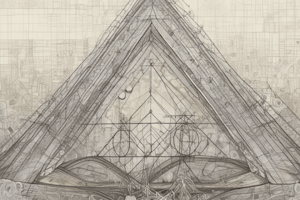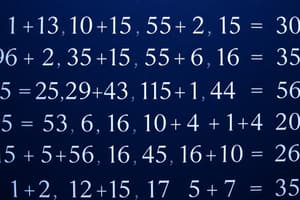Podcast
Questions and Answers
What is the purpose of the distributive property in whole numbers?
What is the purpose of the distributive property in whole numbers?
- To subtract whole numbers
- To add whole numbers
- To divide whole numbers
- To multiply a whole number over addition (correct)
What is the result of multiplying two whole numbers?
What is the result of multiplying two whole numbers?
- Always a fraction
- Always a decimal
- Always a whole number (correct)
- Always zero
If I have 12 pencils and I add 4 more, how many pencils do I have now?
If I have 12 pencils and I add 4 more, how many pencils do I have now?
- 10
- 16 (correct)
- 12
- 14
What is the result of subtracting 2 from 9?
What is the result of subtracting 2 from 9?
If I have 3 groups of 5 toys each, how many toys do I have in total?
If I have 3 groups of 5 toys each, how many toys do I have in total?
What is the result of dividing 18 by 3?
What is the result of dividing 18 by 3?
If I have 24 cookies and I want to share them equally among 6 of my friends, how many cookies will each friend get?
If I have 24 cookies and I want to share them equally among 6 of my friends, how many cookies will each friend get?
What is the result of adding 2 and 6?
What is the result of adding 2 and 6?
Flashcards are hidden until you start studying
Study Notes
Whole Numbers
Definition
- A whole number is a number that is not a fraction or decimal.
- It is a positive integer, including 0.
Properties of Whole Numbers
- Closure Property: The result of adding or multiplying two whole numbers is always a whole number.
- Commutative Property: The order of whole numbers does not change the result of addition or multiplication.
- Associative Property: The order in which whole numbers are added or multiplied does not change the result.
- Distributive Property: The multiplication of a whole number over addition is equal to the sum of the products.
Operations on Whole Numbers
- Addition: Combining two or more whole numbers to get a total or a sum.
- Example: 2 + 3 = 5
- Subtraction: Finding the difference between two whole numbers.
- Example: 5 - 2 = 3
- Multiplication: Repeated addition of a whole number.
- Example: 2 × 3 = 6
- Division: Sharing a whole number into equal parts or groups.
- Example: 6 ÷ 2 = 3
Examples of Word Problems
- Addition: If I have 5 pencils in my pencil case and my friend gives me 2 more, how many pencils do I have now?
- Subtraction: If I have 8 crayons in my box and I give 2 away, how many crayons do I have left?
- Multiplication: If I have 3 groups of 4 toys each, how many toys do I have in total?
- Division: If I have 12 cookies and I want to share them equally among 4 of my friends, how many cookies will each friend get?
Practice Questions
- 4 + 2 = ?
- 7 - 1 = ?
- 3 × 4 = ?
- 9 ÷ 3 = ?
- If I have 15 marbles and I add 7 more, how many marbles do I have now?
Whole Numbers
Definition
- A whole number is a positive integer, including 0, and is not a fraction or decimal.
Properties of Whole Numbers
- Closure Property: The result of adding or multiplying two whole numbers is always a whole number.
- Commutative Property: The order of whole numbers does not change the result of addition or multiplication.
- Associative Property: The order in which whole numbers are added or multiplied does not change the result.
- Distributive Property: The multiplication of a whole number over addition is equal to the sum of the products.
Operations on Whole Numbers
- Addition: Combining two or more whole numbers to get a total or a sum, example: 2 + 3 = 5.
- Subtraction: Finding the difference between two whole numbers, example: 5 - 2 = 3.
- Multiplication: Repeated addition of a whole number, example: 2 × 3 = 6.
- Division: Sharing a whole number into equal parts or groups, example: 6 ÷ 2 = 3.
Examples of Word Problems
- Addition: If I have 5 pencils in my pencil case and my friend gives me 2 more, I have 5 + 2 = 7 pencils now.
- Subtraction: If I have 8 crayons in my box and I give 2 away, I have 8 - 2 = 6 crayons left.
- Multiplication: If I have 3 groups of 4 toys each, I have 3 × 4 = 12 toys in total.
- Division: If I have 12 cookies and I want to share them equally among 4 of my friends, each friend will get 12 ÷ 4 = 3 cookies.
Studying That Suits You
Use AI to generate personalized quizzes and flashcards to suit your learning preferences.




